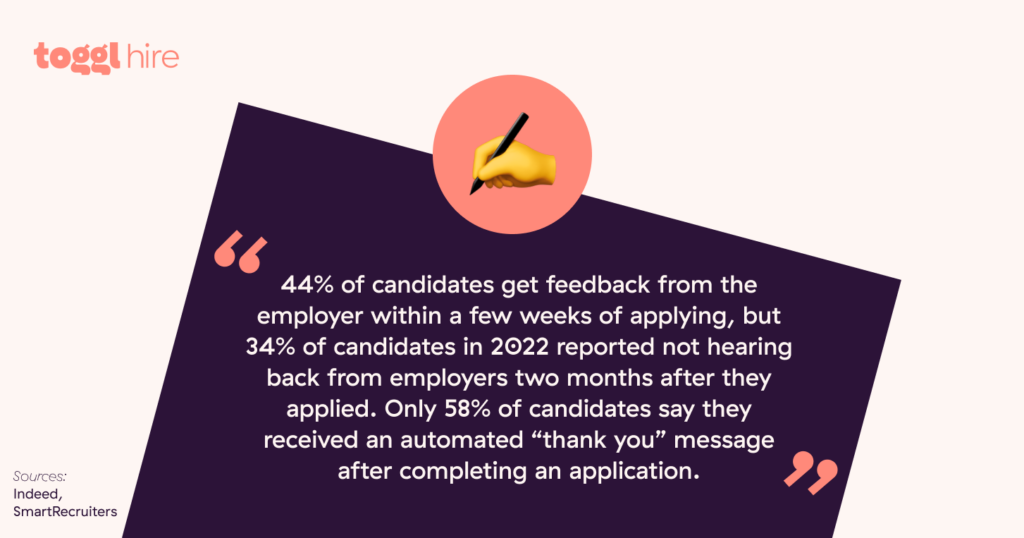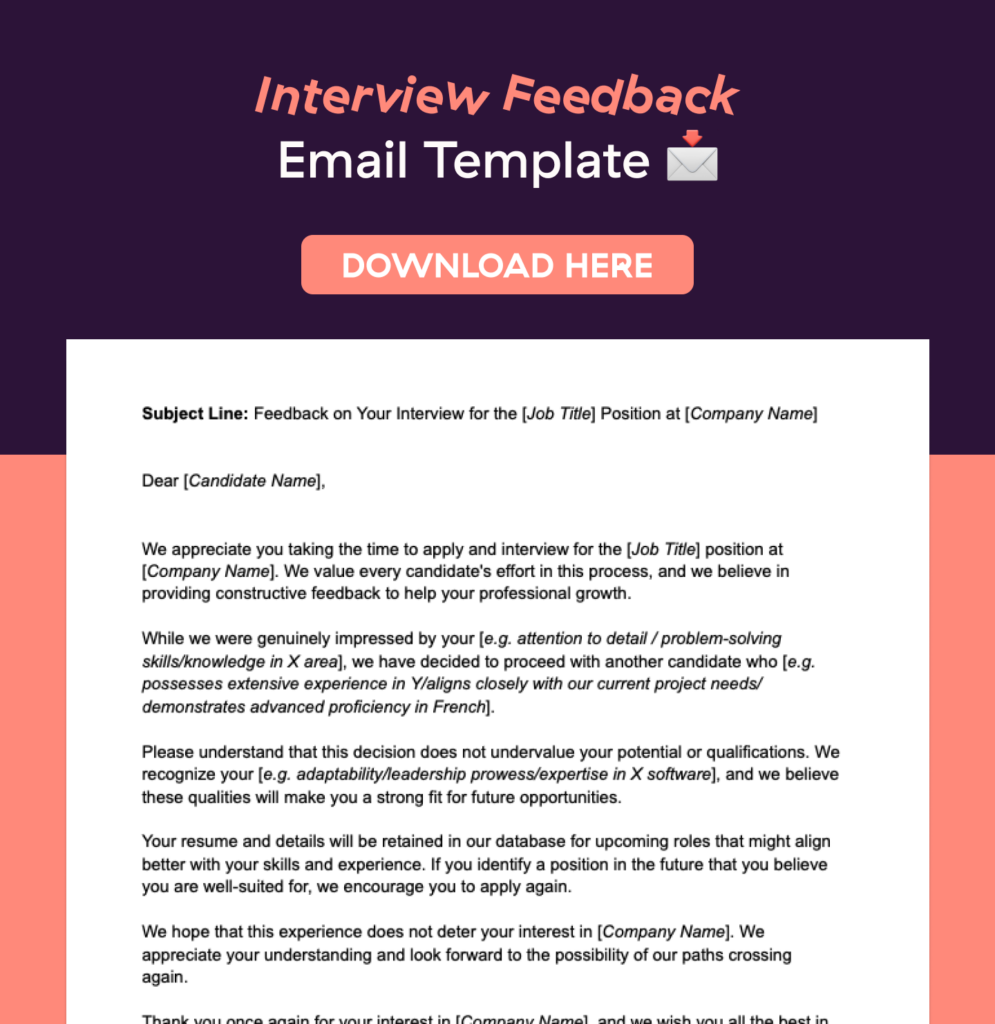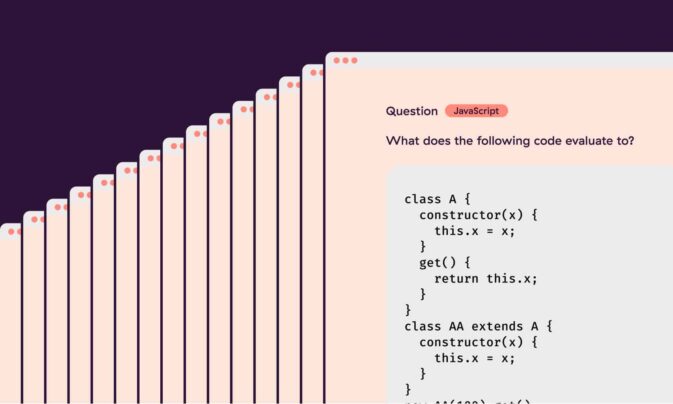95% of job applicants want to get interview feedback, but a whopping 41% never actually get it. And if you’re not offering feedback to candidates, then you need to do better.
At the interview stage of (most) hiring processes, the candidate has already invested precious time and energy with your company, so if you’re turning them down, giving effective interview feedback can soften the blow and do wonders for your employer brand. It’s also just the right thing to do.
But it’s not just about giving feedback — it’s how you give it that makes a difference. If you’ve ever wondered how to give constructive feedback to candidates, we’ve got a few great tips for you based on years and years of experience interviewing and providing positive interview feedback.
TL;DR — Key Takeaways
Interview feedback is the type of feedback employers give to candidates who apply for jobs. It can be classified into three types: positive, negative, and constructive.
Giving timely interview feedback improves your employer brand, enhances the candidate experience, and helps candidates improve, among other things.
To get better at providing candidate feedback after interviews, standardize the interview process, document the feedback, start off with the good sides of the interview, and provide ways the candidate can get better.
What is interview feedback?
Interview feedback is the kind of feedback employers give to prospective candidates after a completed job interview. It’s most commonly given to candidates when they don’t get the job. If the candidate gets a job offer, it’s usually because they aced the interview, and giving feedback isn’t as necessary.
There are three main types of interview feedback that your company and HR team can give.
Positive feedback: Generally encouraging comments about how well the candidate performed in the interview
Constructive feedback: Feedback that includes constructive criticism and suggestions on what the applicant needs to improve
Negative feedback: This type of feedback is rarely given unless the candidate’s interview performance is severely lacking
No matter the type of feedback your team is giving, it takes time to put it in words and communicate it to candidates. That’s why many employers simply leave it out of their hiring process. But as we’ll discuss in a minute, offering interview feedback can have massive benefits for your company.

Interview feedback best practices
Improve your hiring process and help your hiring managers improve the hiring process with these actionable tips for giving great interview feedback to your candidates.
Give feedback as soon as the interview is finished: Take notes during the interview, as having written feedback on hand means the details will be fresh just after the interview for you to summarize and send to the candidate quickly.
Keep the feedback specific to the role: Avoid giving feedback about a candidate’s communication skills, overall presentation, etc.
Be helpful: Offer constructive feedback about what the candidate could improve to help them perform better in their next interview (whether that’s with your company or another).
Go beyond the interview: If a candidate has gone through the entire hiring process, give them feedback on the previous stages as well.
Give specific examples: Talk about exactly what went well (or wrong) so the candidate knows you were paying attention and engaged during their time with you.
Remain tactful: Writing good feedback requires excellent communication skills, so consider your choice of words — you don’t want to come off as rude or insensitive.
Be prepared to answer follow-up questions: And when you do, try to stick to your initial feedback. Consistent feedback is key at every step of the job search/interview process.
Always be kind!
What to avoid when offering interview feedback
The above tips provide you with some great starting points for improving your interview feedback skills. Now, let’s take a look at what you want to avoid.
Don’t compare the candidate with other candidates (especially the one that got the job).
Don’t be vague, as it’s not particularly useful for the candidate, and it may come off like you’re sending a canned response to all applicants.
Don’t be confrontational and attack the candidate.
Don’t raise false hope about continuing with them in the recruitment process if you’re not genuinely interested in extending a job offer or moving them through to the next stage.
The importance of interview feedback
Only 2% of candidates who apply for a job actually go through the interview stage of the recruiting process.
While hiring teams don’t have all the time in the world to answer every single person who begins a job search with their company, a handful of the very best candidates should get actionable feedback about their performance.

It’s the right thing to do. However, even if you’re sold on the altruistic reasons for giving effective feedback to candidates, there are other key reasons why providing interview feedback is crucial for you as an employer.
Enhances employer brand
Taking the time to offer feedback to unsuccessful candidates helps you stand out among the vast majority of companies that simply don’t care. It reflects well on your company’s values and improves the candidate experience. Despite not getting a job, that candidate is more likely to recommend others apply for your openings, as well as write a great review for you on platforms like Glassdoor.
Improves interview techniques
Giving helpful interview feedback isn’t just beneficial for the candidates. Your hiring managers (and the entire team) benefit greatly when they deliver feedback, as it forces them to put their thoughts about candidates in writing. This helps them measure the effectiveness of their own interview questions and helps improve their own soft skills in the areas of communication and critical thinking.
Promotes transparency
Be it positive or negative interview feedback, informing the candidates about how they did demonstrates respect and honesty. It makes them see your company as a transparent employer — even if the feedback isn’t as positive as they’d hoped.
Helps candidates improve
Last but definitely not least, actionable feedback helps candidates get better at their interview skills. Unsuccessful candidates may apply again with your company for future vacancies, and they’ll undoubtedly continue their job search with another company. Whatever the case, the valuable insights you give them will help them make each following interview better.
How to give interview feedback
To give great feedback, you need to put time and effort into the process. It all boils down to setting clear standards, forcing yourself to document interview feedback, and finding ways to deliver the good and bad feedback in a way candidates can appreciate.
Here’s how to do all that.
Standardize the interview process
The path to providing interview feedback starts with standardized interviews. Here are some practical ways to standardize the job interview process:
Ask every candidate the same set of questions
Assess both soft and hard skills
Use skills assessment tools at the beginning of the interview process
Make use of test projects and paid test days to make your recruitment process less biased
Ensure your hiring managers undergo interview training before going into interviews

All of this ensures the hiring manager treats every candidate the same during the interview process. As a result, providing feedback after an interview becomes even easier.
Document interview feedback
Having a great interview evaluation form makes it easier for hiring managers to provide constructive feedback as the interview takes place. Good interview feedback happens then and there during the interview, so don’t wait until it’s finished to write down your thoughts.
Have a set of standardized criteria for each role so you can score candidates objectively in each rubric. For example, the candidate’s performance, communication skills, career goals, and more.
🔥 Don’t want to build your interview evaluation/candidate scorecard from scratch? Download our FREE scorecard template for interviews.

Start with their strengths
Positive feedback should come first. It sets the tone for the rest of the email or conversation. The negative feedback can be difficult to read or hear, but you can use the sandwich technique to soften the blow.
This entails stuffing a piece of negative feedback in between two pieces of positive feedback. That way, the hiring manager won’t come off as a harsh critic.
Provide actionable tips for improvement
Once you’ve given all the feedback you have, it’s time to actually help the candidate get better in their job search.
Provide specific examples of what the candidate has done poorly and give them actionable suggestions on how to improve it. For example, if they’re lacking in SEO skills, point them to a course they can attend to hone their skills and improve their technical expertise.
This way, when they’re in the screening process for their next role, they’ll easily stand out as great applicants.
Ask for candidate feedback
Hiring is a two-way street, and just as you can give feedback to candidates, they should also provide feedback to you in regard to your hiring process. When you send them an email or make a call to give them interview feedback, ask about what you could improve as a company.
With Toggl Hire, you don’t have to worry about this aspect, as feedback is built into the app, and the candidate is asked to voice their opinion upon completing the talent assessment every time. This is how we know that 80% of candidates using Toggl Hire to complete assessments as part of applying for jobs love the experience.
15 interview feedback examples
Candidate feedback should always be personalized and tailored to the individual that you’re writing to (or calling). These examples are a great starting point, but make sure to adjust and personalize them for your own use case.
🎉 Positive interview feedback examples
The candidate has exceptional communication skills and a positive attitude towards new challenges at work. With their strong technical skills, they’re certain to perform well on the job.
The candidate’s hard skills are exactly what we need, and their personal values align perfectly with the company’s mission and vision. They would be a valuable asset to the team.
Not only does the candidate demonstrate familiarity with the latest industry topics, but they also have the right qualifications and mindset to step into a management role.
The candidate’s sales skills are exceptional, and combined with their adaptability, this means that they would make a great sales development representative for our team.
The candidate has up-to-date knowledge of the most recent programming languages, and with their work ethic, they would be a great programming team lead.
🧱 Constructive interview feedback examples
The candidate shines in the technical SEO domain but needs to brush up on their content strategy skills to offer a more comprehensive package to anyone hiring for an SEO strategist.
The candidate’s technical skills are superb, and they are a resourceful developer. However, they need to improve their collaboration and communication skills to perform better as a part of a team.
As a designer, the candidate has a solid theoretical background. However, we suggest getting up to speed with the latest design and collaboration tools to be more competitive in the job market.
The candidate performed well in the test, and their previous employment history is flawless. However, their communication skills during the interview were subpar and left a poor impression on the hiring team. We suggest trying out public speaking classes to help bring out the candidate’s personality more.
The candidate seems to be a good recruiter, but at this stage in their career, we expected a larger network of candidates they previously connected with. We suggested building out a more diverse candidate pool in the future.
💻 Technical interview feedback examples
The candidate demonstrates exceptional problem-solving skills and successfully navigates all coding challenges, be it interpreting code or writing code from scratch.
The candidate’s technical SEO audit of the website is in-depth and actionable and demonstrates knowledge of the leading industry tools and processes.
When it comes to the technical aspects of the project management role, the candidate showed great knowledge of modern methodologies such as Agile, as well as tools like Clickup, Jira, and Monday.com.
😔 Unsuccessful interview feedback examples
There is a mismatch between the candidate’s resume and their performance on the skills assessment test. The candidate does not have the technical skills to perform well on the job.
The candidate lacks a deeper understanding of the product management process and is not yet ready to move into a role as Senior Product Manager.
Interview feedback email sample
The content of the email you write is very important. But it’s just as important to deliver it in a timely manner — ideally very soon after the interview is complete.
Since reaching out to every candidate through phone or a video call is rarely possible, using email templates is a quick way to deliver feedback in a timely way. Steal ours and personalize it however you need!

Toggl Hire makes giving interview feedback easier
When done tactfully, giving interview feedback can improve the candidate experience, boost your employer brand, and help the job seeker excel in future interviews. But we get it — it’s tough to find the time (and energy) to offer feedback to every candidate you speak with.
With Toggl Hire, you can give every candidate detailed feedback automatically as part of testing candidates’ skills using pre-built tests for hard and soft skills (to assess them fairly). You also get access to a candidate scorecard that lets you take notes to easily translate into feedback and email templates for sending better customized feedback.
Want to automate and improve providing feedback to candidates? Sign up for your free trial today to see all of these features in action!

Mile is a B2B content marketer specializing in HR, martech and data analytics. Ask him about thoughts on reducing hiring bias, the role of AI in modern recruitment, or how to immediately spot red flags in a job ad.






